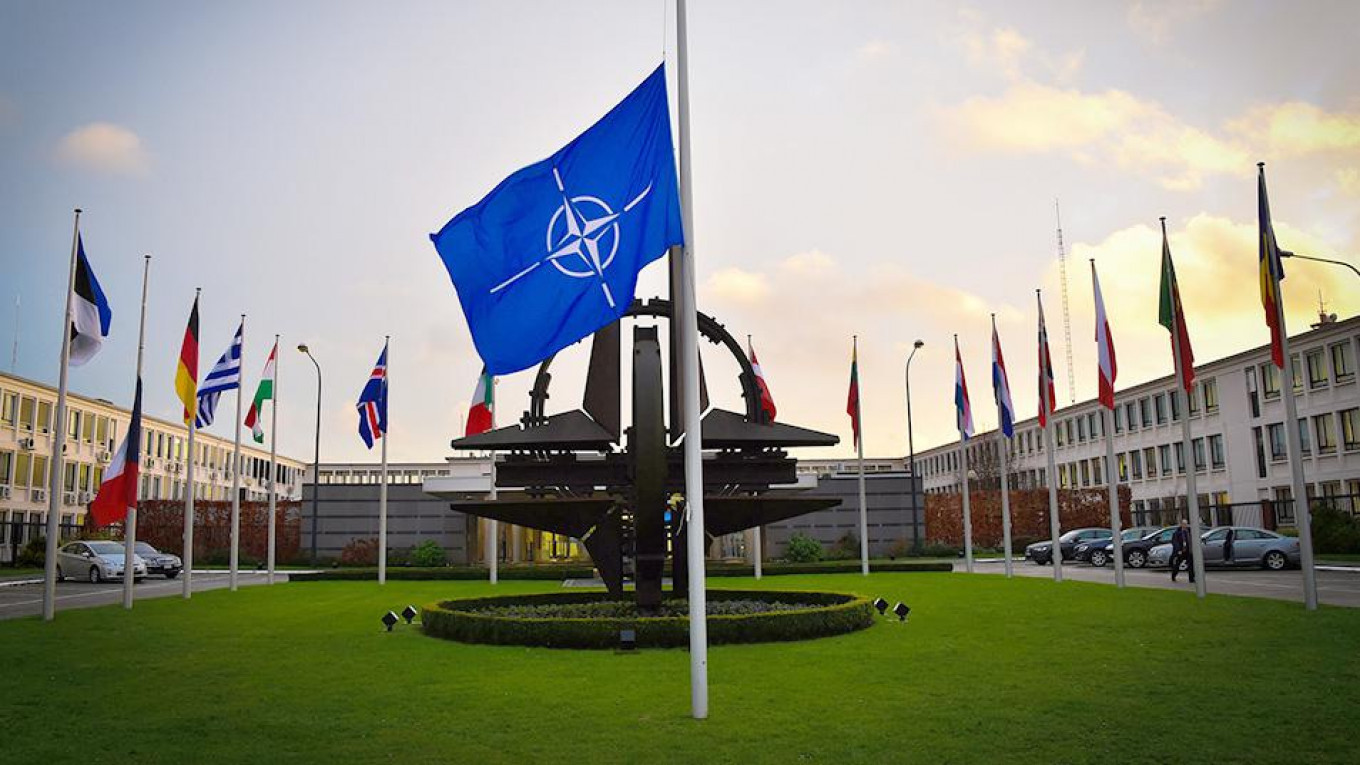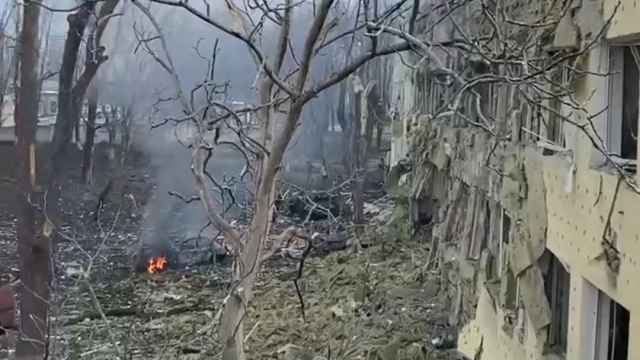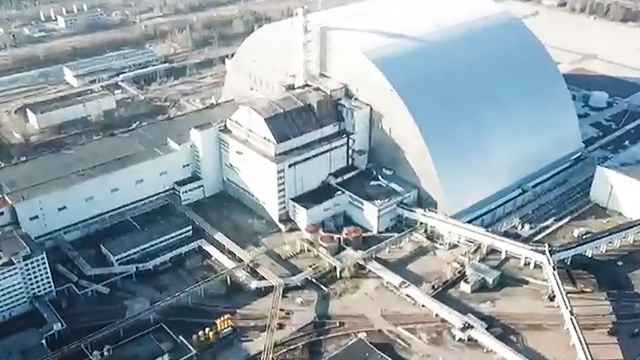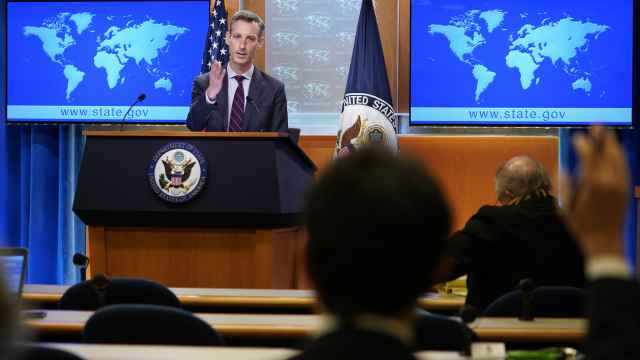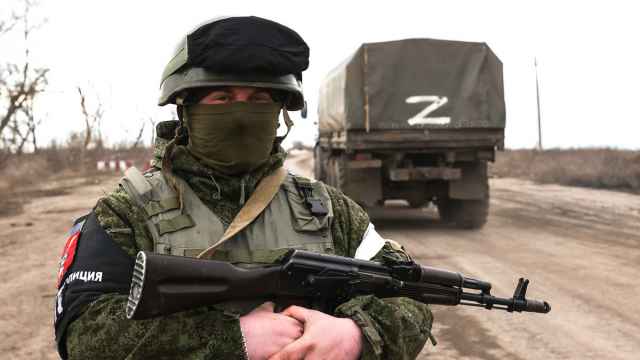NATO said Monday it was sending jets and ships to bolster its eastern European flank, as the U.S. and EU looked to coordinate a tough response to Russia if it invades Ukraine.
Tensions have soared over Russia's deployment of some 100,000 troops and heavy armour at its neighbour's borders, despite the Kremlin's insistence it is not planning a new incursion almost eight years after it seized Crimea.
The United States, Britain and Australia ordered diplomats' families to leave Kyiv, while France told its citizens to avoid non-essential travel to Ukraine.
Both Kyiv and the European Union's foreign policy chief said any withdrawal of diplomatic personnel appeared premature, amid doubts over how imminent any attack could be.
But the tensions helped send global markets sharply downwards — with Russia's stock market plunging and its central bank suspending foreign currency purchasing after the ruble slumped.
Top U.S. diplomat Antony Blinken dialled in to a meeting of his EU counterparts in Brussels to brief them on his meeting Friday with Russian Foreign Minister Sergei Lavrov, where the two sides failed to make a breakthrough but agreed to keep talking.
The U.S. is trying to marshal its allies to prepare an unprecedented package of sanctions on Moscow if it deploys more of its forces — and EU officials insist they could hit the Kremlin with "massive consequences" within days if needed.
The U.S.-led NATO alliance said its members were placing troops "on standby" and sending ships and jets to bolster eastern Europe's defenses in response to the Russian buildup, pointing to recent decisions by Denmark, Spain and the Netherlands to mobilize forces.
"NATO will continue to take all necessary measures to protect and defend all allies," NATO chief Jens Stoltenberg said.
The Kremlin accused the alliance of ramping up tensions through "information hysteria" and "concrete actions", claiming the risk of an offensive by Ukrainian troops fighting Russian-backed separatists in the east of the country was "very high."
EU foreign ministers were sounding out Blinken over a written response Washington has committed to provide to Moscow this week after the Kremlin laid down a series of security demands, including preventing Ukraine joining NATO and rolling back the alliance's forces in eastern Europe.
The EU's foreign policy chief Josep Borrell said the bloc has as yet no plans to pull diplomatic personnel out of Kyiv, adding there was no need to "dramatize" the situation while talks with Russia continued.
'Never seen before'
The EU — in consultation with the U.S. and other allies — is pushing to put together a package of sanctions against Moscow that it hopes will help deter Russia from any military action.
Foreign ministers are not expected to give approval to any options for sanctions on Monday, but an EU source said Russia's mammoth oil and gas supplies to Europe could be targeted.
"There's no doubt we are ready to react forcefully with comprehensive sanctions — never seen before," Danish Foreign Minister Denmark FM Jeppe Kofod said.
The 27-nation bloc faces a complex task compiling its raft of measures as its members have starkly differing approaches and ties to Russia.
Ukrainian President Volodymyr Zelenskiy urged his western partners to "preserve the unity of all EU member states in protecting the sovereignty and territorial integrity of our state."
The new government in EU economic powerhouse Germany has faced criticism from Kyiv over its refusal to send arms to Ukraine and hesitation over calls to cut Moscow out of the global SWIFT payment system.
German Foreign Minister Annalena Baerbock insisted any further aggression from Moscow would get a "clear response" from Europe and talked up the economic support Berlin gives Kyiv.
European Commission chief Ursula von der Leyen said the bloc was preparing a 1.2-billion-euro emergency financial aid package for Ukraine.
Britain, which left the EU at the end of 2020, ramped up the rhetoric with Moscow over the weekend by alleging it had information the Kremlin was seeking to install a "pro-Russian" leader in Kyiv.
And on Monday, Prime Minister Boris Johnson warned Russia an invasion could prove to be a "new Chechnya" — referring to Moscow's bloody conflict in the 1990s over the territory.
Non-NATO member Ireland meanwhile sounded the alarm over upcoming Russian military exercises off its southwest coast in the international waters of the Atlantic.
A Message from The Moscow Times:
Dear readers,
We are facing unprecedented challenges. Russia's Prosecutor General's Office has designated The Moscow Times as an "undesirable" organization, criminalizing our work and putting our staff at risk of prosecution. This follows our earlier unjust labeling as a "foreign agent."
These actions are direct attempts to silence independent journalism in Russia. The authorities claim our work "discredits the decisions of the Russian leadership." We see things differently: we strive to provide accurate, unbiased reporting on Russia.
We, the journalists of The Moscow Times, refuse to be silenced. But to continue our work, we need your help.
Your support, no matter how small, makes a world of difference. If you can, please support us monthly starting from just $2. It's quick to set up, and every contribution makes a significant impact.
By supporting The Moscow Times, you're defending open, independent journalism in the face of repression. Thank you for standing with us.
Remind me later.


